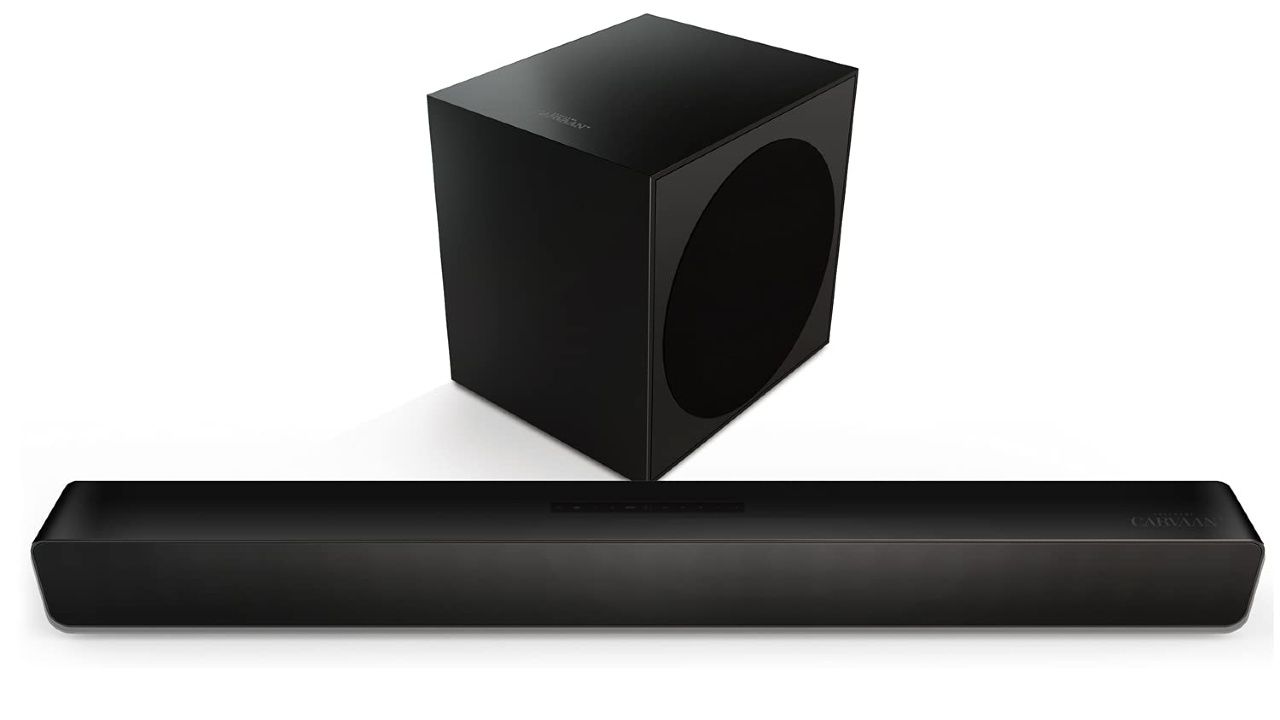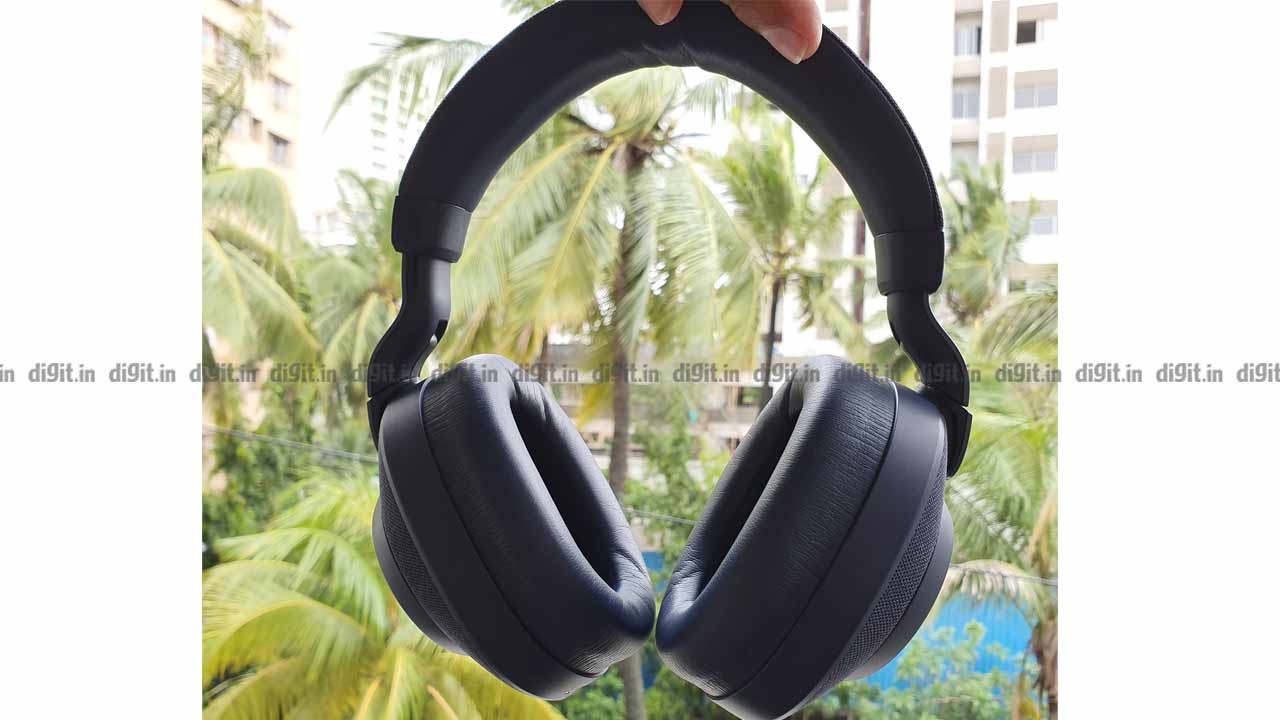
[ad_1]
Soundbars have become popular over the past couple of years to compensate for the lacklustre quality of sound output from TVs. Today, soundbars pack in quite a punch in terms of sound as well as features. From having smart assistants built-in, being modular in nature and even boasting of a complete home theatre experience, soundbars today have become an exhaustive category in themselves.
Over the past year, we have seen a lot of brands launch Soundbars without a subwoofer such as the Mi Soundbar (review), Bose Soundbar 700 (review) and more. Today we have with us a new addition to this category – the Sony HT-X8500. The device is compact, comes without a subwoofer and is the first soundbar we’ve tested that boasts of eARC. Priced at Rs 29,900 is the Sony HT-X8500, a worthy contender, or are you better off looking at other soundbars in the sub 30k price range? Let’s find out!
What’s in the box
In the box, you get the soundbar itself along with a remote control. You also get two AAA batteries, HDMI cable and of course, the power cable. One thing to note is that the adapter is external and if your wall socket is further away from the place where you want to place the soundbar, you may want to think strategically on how to hide the power brick. I also wish the cable that connected the power brick to the wall was a little longer as in our setup the power brick was hanging off the table a bit. The remote control accompanying the system is simple and in line with what we’ve seen from Sony in the past. There is a ‘Vertical Surround’ button on the remote and we will delve into that in later sections. Know that when you use ARC to connect the soundbar to the TV, you can control the bar from the comfort of the TV remote.
Connectivity options
When it comes to connectivity options, the soundbar has an HDMI port for eARC/ARC and one HDMI pass-through port that supports 4K HDR pass through. In the same price range, we have seen soundbars like the JBL SB450 (review) with 3 HDMI passthrough ports with 4K HDR passthrough. The Sony HT-X8500 also has an optical port and has Bluetooth 5 connectivity. Speaking of formats supported, the speaker does boast of support for DTS-X and Dolby Atmos which is nice. However, without top firing speakers or rear speakers, we were interested to see how the object-based surround sound works on this bar. There is no Alexa or Google Assistant support with this speaker either.
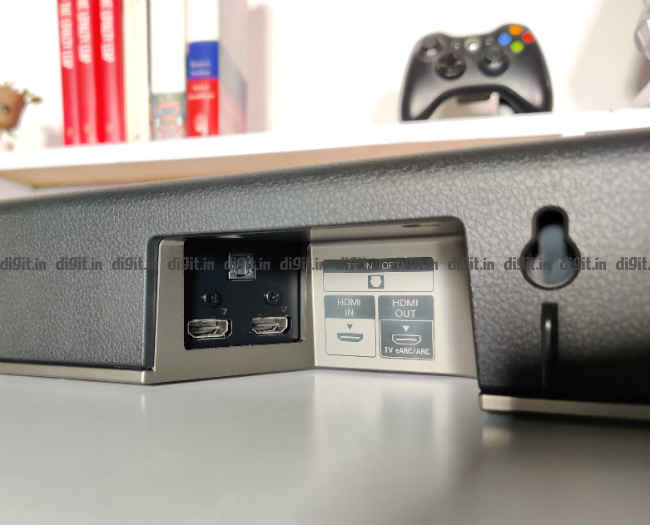
Setting up the Sony HT-X8500
Setting up the speaker is as easy as placing it below your TV, connecting it via HDMI and you are good to go. However, there is one thing to keep in mind here. If you are using a smart TV that has HDMI 1.4, then you won’t see the “Dolby Atmos” tag in relevant Netflix content. When connected to a TV with HDMI 2.0 (HDCP 2.2 support) we saw the Dolby Atmos tag appear in Netflix content and this is something to keep in mind when purchasing the soundbar. It will work with your current FHD (HDMI 1.4) TV and when you upgrade to a 4K TV, you will notice the slight difference in the audio quality. This is great as it future proofs your sound setup.
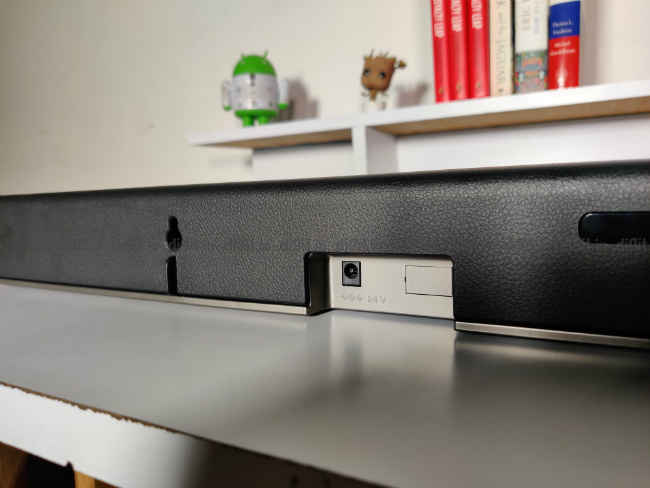
Build and design
Speaking of the design of the soundbar, it is available in one colour only – black. The top of the soundbar has a matte textured finish with LED indicators and touch buttons for functions such as power, source, Bluetooth and volume controls. The touch buttons are quite sensitive and can be controlled with just a light tap. But they aren’t so soft as to respond to accidental touches. The LED Indicators represent Dolby Atmos, DTS-X, Vertical Surround, TV, HDMI and Bluetooth. Once you know which LED indicator is for what, it is easy to identify the source that is currently active. However, some may prefer a traditional display for source and volume information. When you control the volume, all the LED’s light up sequentially to show the level of output sound. All of them are lit to indicate full volume and then from the right to left they gradually start dimming, one by one, to signify a reduction in volume. This is a small change, but one that eliminates the need for a display on the soundbar. The LED’s are not too bright, so using them in a pitch dark room does not hamper the experience. The textured matte finish on the top is nice, does not attract fingerprints or dust and gives the soundbar a clean look.
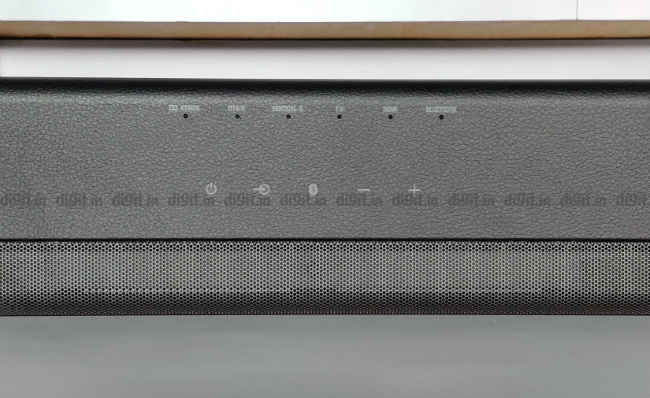
All the connectivity ports are laid out at the back, in a cavity on the right. It is easy to reach and neatly laid out. There is another cavity on the left that houses the power port. You also have the option to wall mount the soundbar if you like.
Coming to the bottom, it has a metal finish with rubber feet strategically laid out to prevent vibrations. The rubber feet are small and don’t elevate the soundbar too much, which is nice.
The front of the soundbar is dominated by the metal grill and if you shine enough light on them, you can see the four drivers powering it. Two are in the middle and one on either side. On the right and the left of the soundbar, you have the ducts for your bass output.
Overall, the build of the soundbar is extremely solid, better than the JBL SB 450 bar, has a clean look and finish and looks minimalistic in a home theatre setup. Just the way we like it.
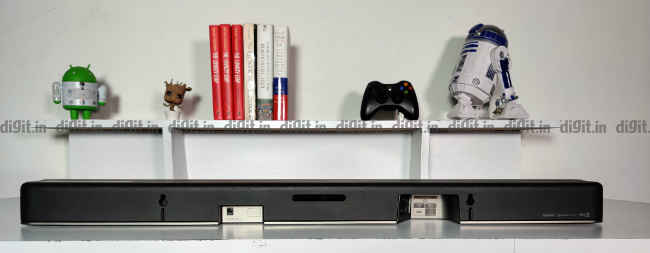
Performance
For around the same price (give or take a few thousand rupees), you can get soundbars with a subwoofer. So how does the Sony HT-X8500 perform? Well, in a nutshell, the soundbar has good sound reproduction and channel shift especially when you use it in a bedroom (12 feet x 15 feet). In a larger room, the surround effects are lost. Needless to say that out of the box, the Virtual surround feature is gimmicky. It does expand the sound stage of the audio coming from the speaker, but it is nowhere close to giving you a Dolby Atmos like experience.
We’ve broken down the performance section into movies, music and gaming performance.
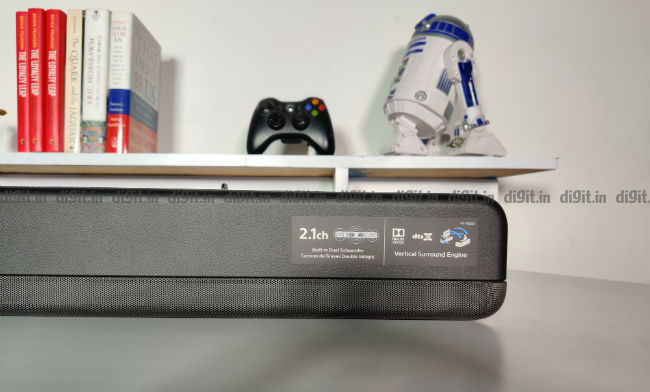
Movies
Watch movies and you will realize that the soundbar has a clear reproduction of sound. The dialogue is clearly audible even if there is a background score playing. From the bike chase sequence in Mission: Impossible to the guns firing all over the place in the Matrix and even in shows like Altered Carbon where you have gunfights and bullets whizzing all around, the soundbar does a good job of immersing you. Even though the sound is coming from directly in front of you, the channel separation is good. The bass though present seems lacking especially when you are watching an action movie like Mission: Impossible. The thud that brings you into the action is present but lacking. Dialogue is very clear, even in the heat of battle in a movie like John Wick.
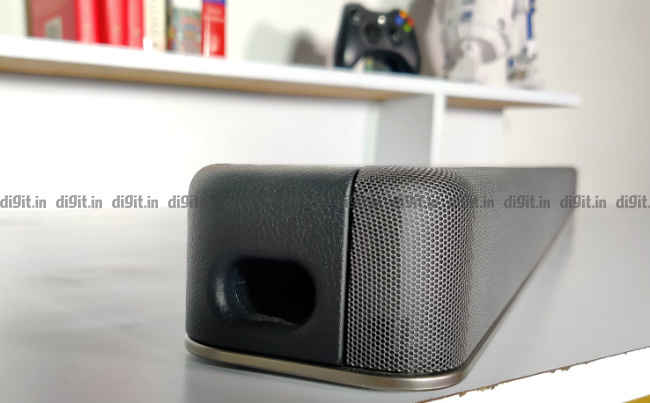
Music
The Music performance of the Sony soundbar is what you’d expect from a Sony speaker. It is also dependent on the kind of music you listen to. So with classic rock, where the bass isn’t necessarily overpowering, it sounds clean. Vocals are distinguishable from the instruments and highs are clear. Electronic music like Daft Punk is clear where you can make out sounds of the synthesizer. Heavy metal music lovers will feel the lack of bass. The speaker doesn’t distort at loud volumes and you can use this as the centrepiece when you have a party at home. At 70 per cent volume, the soundbar sounds really loud and you don’t need to pump it higher. But you can and we went up to 90 per cent and the audio did not distort. It got really loud though.
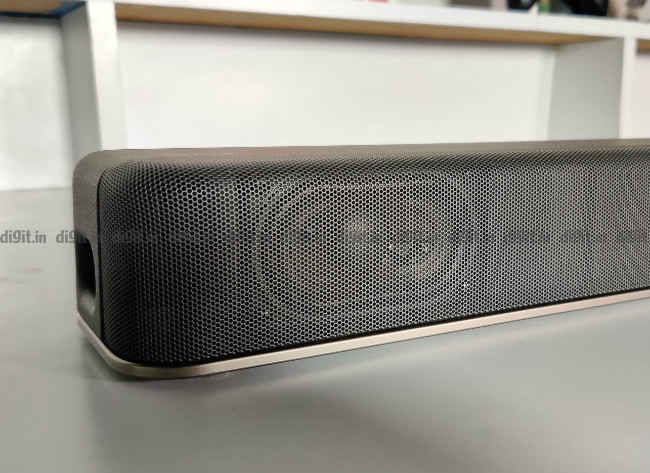
Gaming
For gaming, we played Marvel’s Spider-Man, God of War and Doom. Channel separation works well in all the games and when you turn your character around in the middle of a conversation or battle, the sound shifts on the speaker too which is good. In a game like Doom, the shotgun sound is dominated by a subwoofer, but honestly, I didn’t miss it. Sure, when you switch to a soundbar with a sub, you can clearly make out the difference, but considering the performance of the device as a bar alone, it works rather well. Even in Spider-Man, the gushing of wind and the swish of the webs is well pronounced.
Overall, if you lack the space, or don’t want a subwoofer for some reason or want a simple plug and play solution and are worried that the bass is lost, then worry not. For the average-sized bedroom, this is a good no-nonsense soundbar. However, know that in all the above tests, we switched on and off the virtual surround mode. It did increase the sound stage a little bit, but it doesn’t come close to giving you a true Dolby Atmos experience.
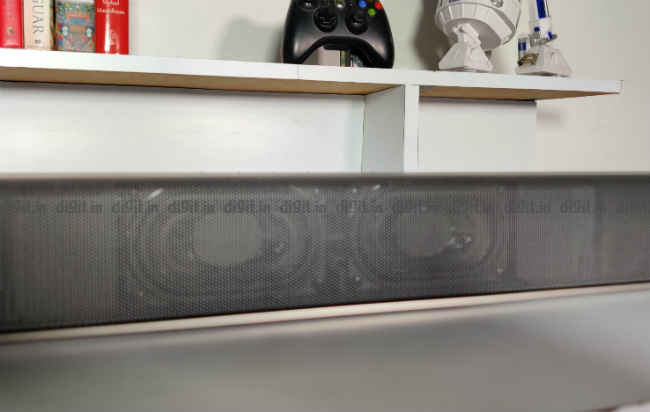
For bass heavy performance in a large living room, you can check out the JBL SB 450 (Review).
Remote control
The bundled remote control with the soundbar is simple and traditional – something we have seen with many Sony sound systems. All the buttons are on two vertical columns with the volume controls in the centre. On the remote control, you have the options for input, control for the various modes, a mute button. Buttons like Voice and DTS Dialogue help with boosting the vocals if you like, whereas functions like Night ensure the loud explosions and guns in action movies don’t get too loud. You can make out the difference when switching between different modes and those that don’t want to delve into settings can use the Auto Sound options.
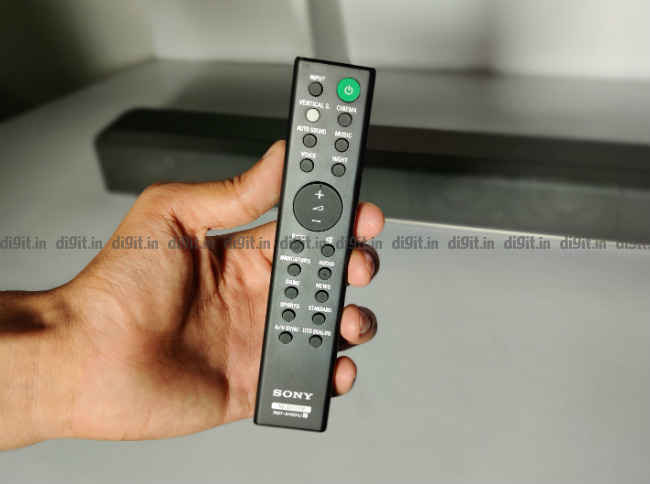
Bottom line
So, here’s the ever-important question. Should you spend 30K on this soundbar? Well, the answer lies in what it is that you are looking for. If you want loud bass and are looking for an immersive home theatre-like experience with no compromise on bass, then there are other options to choose from. However, if you are looking for a bar to upgrade the sound of your TV and also want it to double up as a multimedia speaker, then you can consider it. It works well for content consumption like movies, games and even music. It also supports formats like DTS-X and Dolby Atmos. However, apart from slightly increasing the fidelity, don’t expect to hear the sound from all around you as the vertical surround effects are gimmicky.
[ad_2]
Source link

